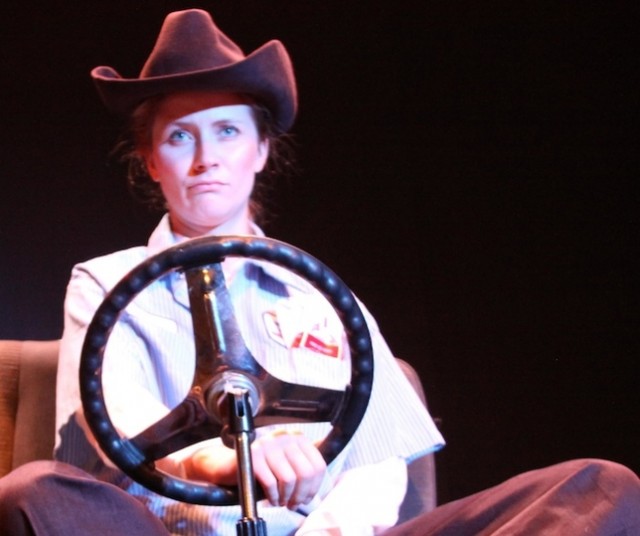TRIPLE DISTILLED SOUTHERN GOTHIC
SoHo Playhouse, the Huron Club
15 Vandam St.
Monday nights at 8:00 through May 13, $20
866-811-4111
www.sohoplayhouse.com
www.newumbrella.org
Southern native Elisabeth Gray evokes the ghosts of Tennessee Williams, Walker Percy, and Flannery O’Connor in her new one-woman show, Southern Discomfort. Over the course of seventy minutes, Gray explores personal loneliness as she portrays six characters in seven vignettes, ranging from nineteen-year-old Josh Robinson Riddle, a one-handed North Carolina lad working at a gun show, to ninety-one-year-old South Carolinian Penelope Weaver, who bookends the New Umbrella production with her aging mind’s meanderings. Gray, who was born and raised in the South and recently made her Broadway debut in various small roles in the short-lived Breakfast at Tiffany’s, also plays twenty-seven-year-old Alabamian Julia Hanover, who is obsessed with crooked faces; forty-one-year-old Tennessee truck driver Jonny Stutts, who discusses porn with an unseen traveling companion; fifty-two-year-old Cheri Kane, who is giving a speech at the Olive Branch Mississippi Women’s Historical Society announcing that the club has accepted its first black member; and sixty-three-year-old William Ernest Fells, a Georgia man eulogizing his deceased wife. In the show — which is subtitled Triple Distilled Southern Gothic and runs Monday nights through May 13 in the Huron Club bar downstairs at the SoHo Playhouse, with free bourbon-and-lemonade cocktails — Gray and director Daniel Zimbler take on such topics as racism, sexism, guns, ideals of beauty, violence against women, love, family, and the Civil War without getting preachy or pedantic. Sometimes Gray’s point is too abstract, as in the pieces involving Weaver, but otherwise she employs a careful subtlety while avoiding clichés and stereotypes. She also involves the audience by occasionally using various paying customers as characters in her stories, pointing them out in the crowd and addressing them directly. (Try to get their early if you want a table instead of sitting on a stool at the bar or on a long couch.) At its heart, Southern Discomfort works because there’s a basic truth inherent in Gray’s telling; in the program notes, she explains that all of the characters are based on actual people she has known, resulting in believable situations that touch on both the comic and the tragic.
